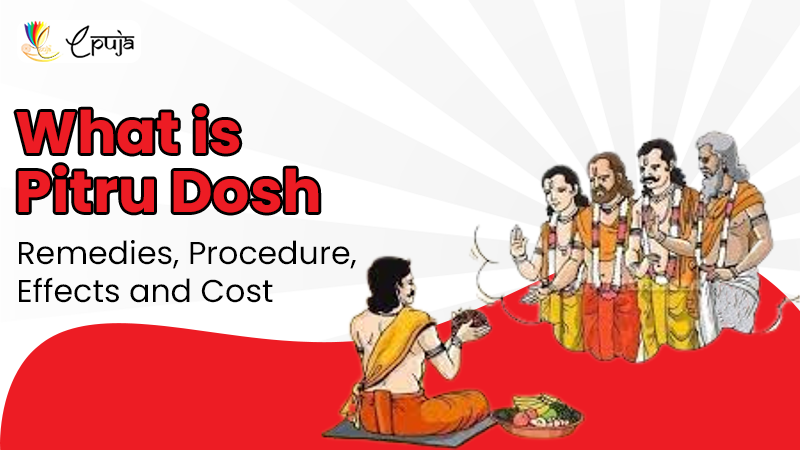
This blog provides a complete guide on types of Pitru Dosh, its effects and remedies, and the costs associated with these remedies.

Kukke Subramanya temple is dedicated to Lord Karthikeya and is situated in Karnataka. Lord Karthikeya, the son of Lord Shiva and Goddess Parvati is worshipped as the lord of serpents.
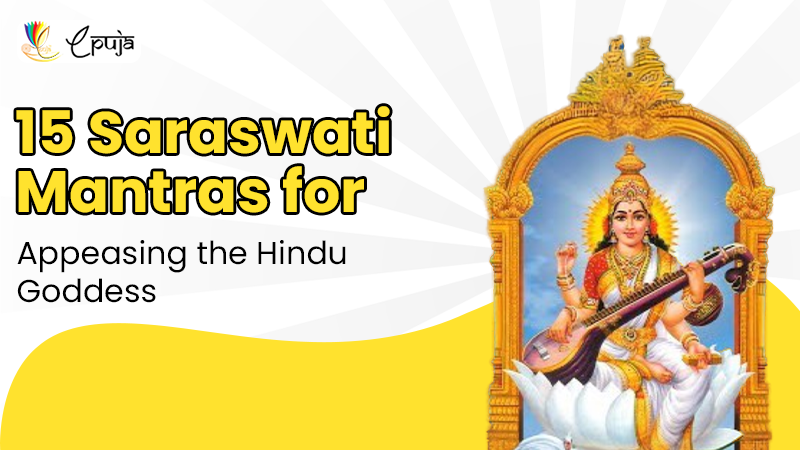
Read further in the blog to learn about 15 Saraswati Mantras for Appeasing the Hindu Goddess, specific Saraswati mantras for students and the benefits of Saraswati mantras.
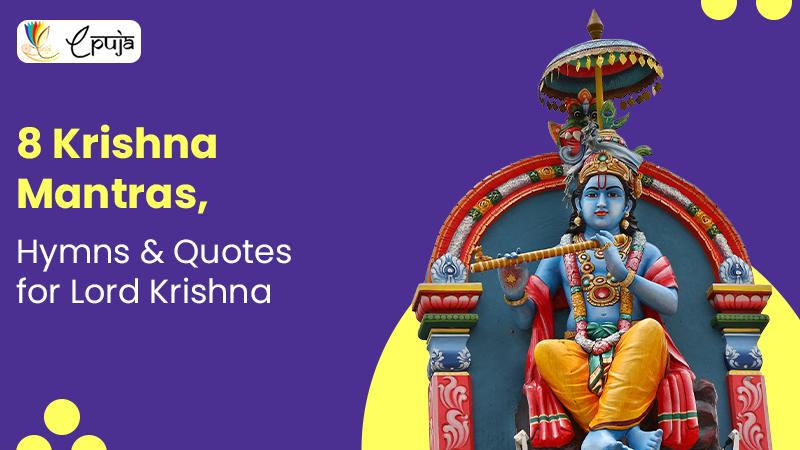
Krishna is one of the most revered and worshipped deities in Hinduism. He is believed to be the eighth incarnation or avatar of Lord Vishnu
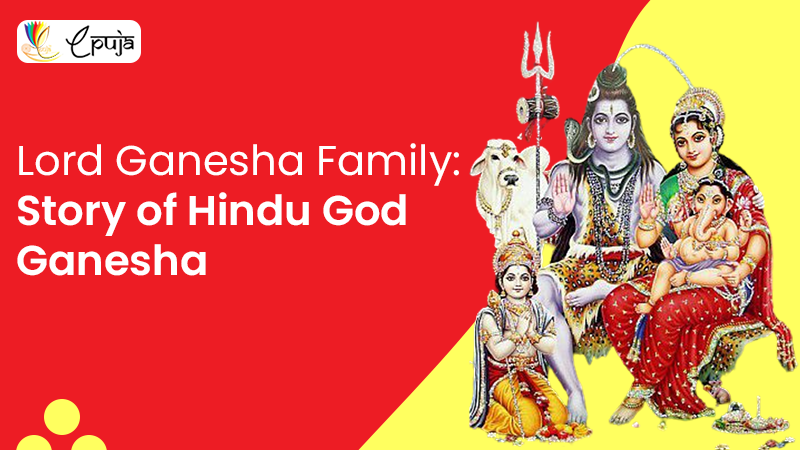
Lord Ganesha is the most worshipped deity in Hinduism and is known by many names including Ganapati, Vinayaka, Bappa, Siddhivinayak, Gajanana and many more.
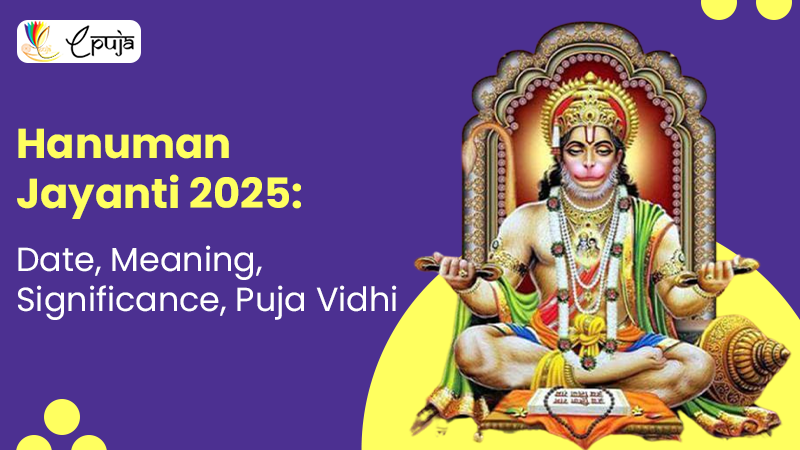
Hanuman Jayanti, a day dedicated to Lord Hanuman or Lord Anjaneya, is one of the most important festivals in the Hindu culture
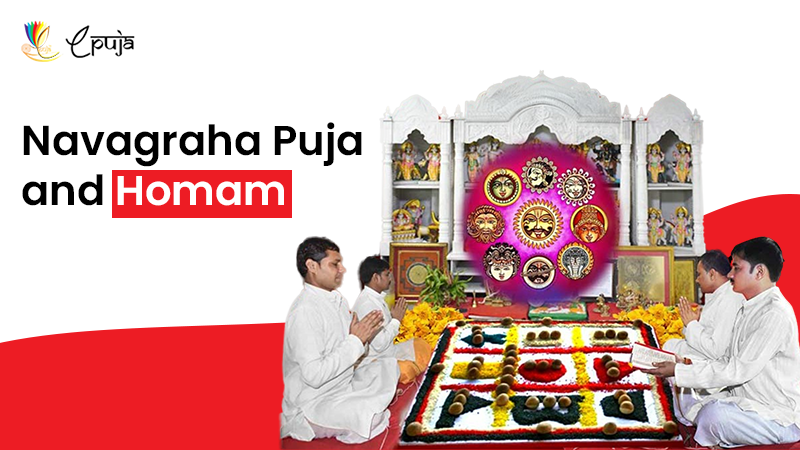
ePuja is the ultimate solution for all your puja needs. With access to over 3600 temples across India, ePuja makes sure that you are connected to divinity no matter where you are.
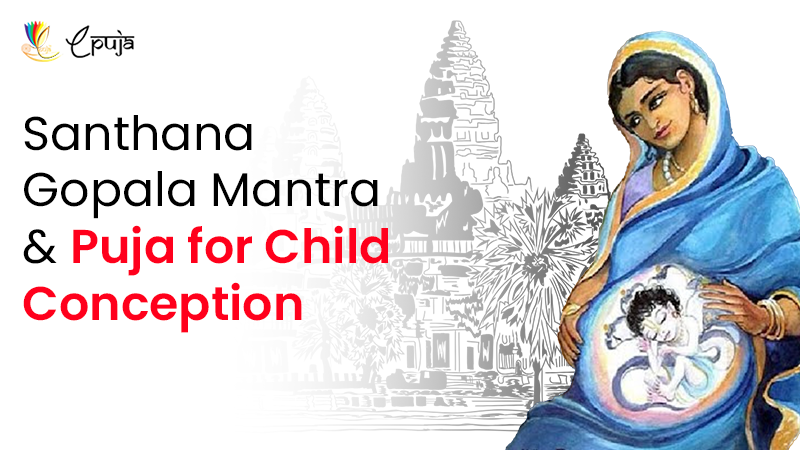
In our culture, families tend to become complete and more meaningful when they have children. A child is one of the most special desires for a couple and a family. There are multiple reasons why many couples are finding it difficult to conceive.
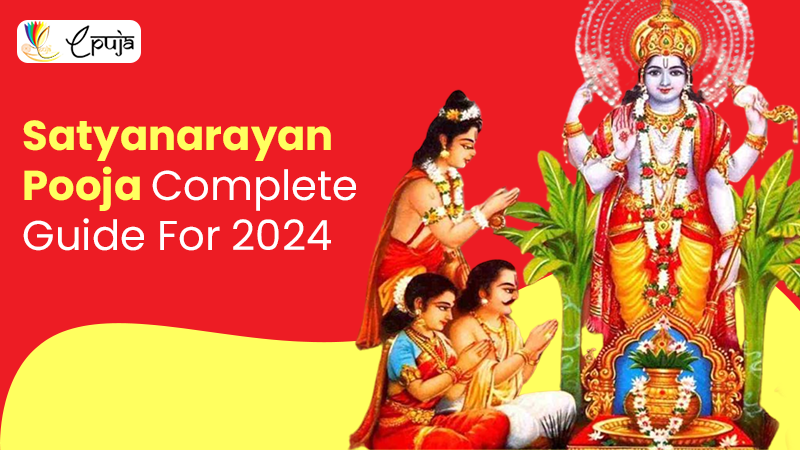
Hinduism has certain rituals and pujas that can be done to express gratitude and seek blessings for health and prosperity. Satyanarayan pooja is one such ritual that is dedicated to Lord Satyanarayan or Lord Vishnu.
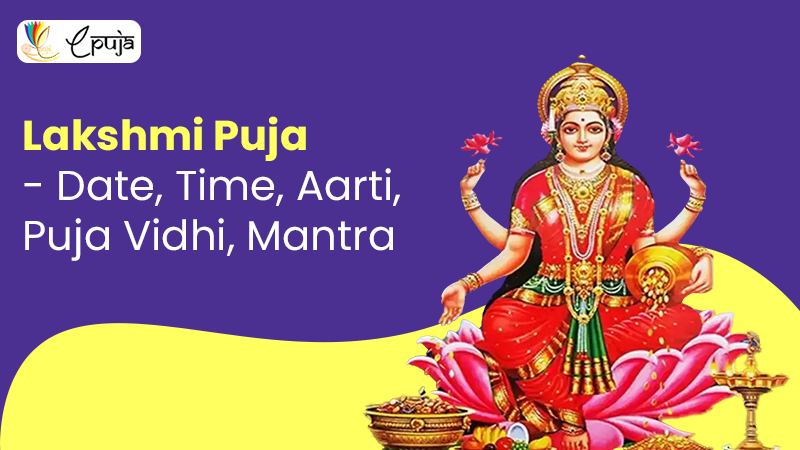
Goddess Lakshmi holds a very important and auspicious place in Hinduism. Every Hindu devotee worships Goddess Lakshmi. She’s believed to bless her devotees with wealth, prosperity, and abundance.
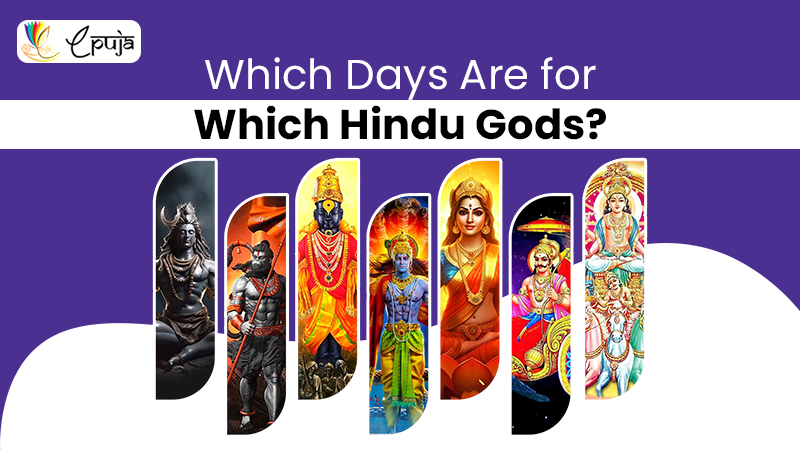
In Hinduism, there are multiple god and goddesses and each one of them is worshipped with different affirmations. In a week, each day is dedicated to a specific deity (god or goddess), and specific rituals are performed to honor these deities.
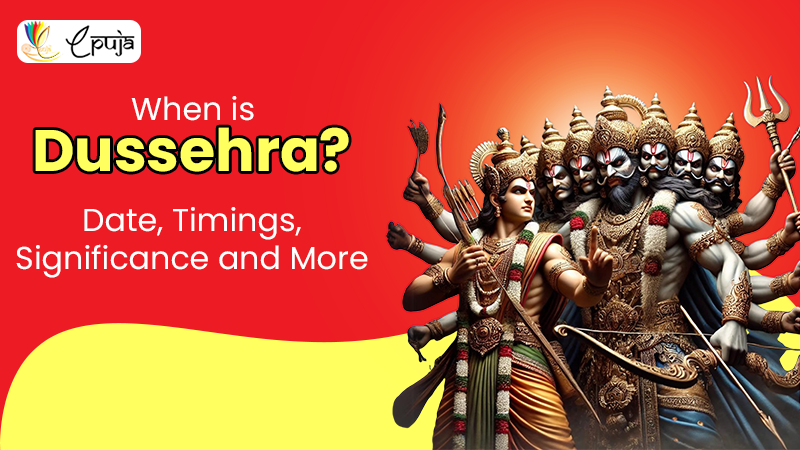
Dussehra or Vijaydashmi is one of the most joyous and vibrant festivals celebrated in India. It holds immense cultural and religious significance and symbolizes the triumph of good over evil. This Hindu festival is very auspicious and is connected with multiple rituals. It is a festival that brings people together among all the diversity.

Gudi Padwa is a festival that augments the new year and is usually celebrated on the first day of the Indian month of Chaita according to the lunar calendar. Most of the Indian festivals have a very special and intriguing history and it is interesting to see the manner in which they are celebrated. This Maharashtrian festival is no exception and provides you with many tales related to it. Also called Ugadi in the Indian state of Karnataka, this is a festival, which is filled with a certain charm, and vibrance that is visually delightful.

Celebrated all over India since ancient times, Holi was an originally an agricultural festival to celebrate the arrival of spring.

In Hinduism, Mahashivaratri (also called Shiva Ratri) is the great festival of Lord Shiva. It is held on the 14th day of the dark half of the lunar month of Phalguna. Mahashivaratri is especially important to Saivites (devotees of Lord Shiva), but it is celebrated by most Hindus.

As per Hindu mythology, the head of the snake is known as Rahu and the tail of snake is known as Ketu. Rahu and Ketu are placed in opposite direction at 180 degree and can never meet each other. The Rahu and Ketu are shadow planets and they cannot be seen through naked eyes. When all the seven planets are placed in between Rahu and Ketu it is called Kalasarpa Yoga. There are 12 different types of Kalsarpa Dosha that exist. The dosha originates by harming or killing a snake and also by hurting Lord Subramanya.

Vaishnavism (Vaishnava dharma) is one of the major traditions within Hinduism along with Shaivism, Shaktism, and Smartism. It is also called Vishnuism, its followers are called Vaishnavas, and it considers Vishnu as the Supreme Lord.

Thiruvanaikaval also known as Thiruvanaikal, in Jambukeswaram, is a famous Lord Shiva temple in Tiruchirapalli (Trichy), in the state of Tamil Nadu. The temple was built by Kocengannan (Kochenga Chola), one of the early Cholas, around 1,800 years ago. It is located on the Srirangam island, which has the famous Ranganathaswamy temple.

Tirunageswaram Temple Rahu Stalam is a Hindu temple dedicated to the Lord Shiva is located in Tirunageswaram, a village on the outskirts of the town Kumbakonam in Tamil Nadu, India. It is significant to the Hindu sect of Saivism as it is one of the temples associated with the nine planet elements, the Navagraha Stalas, specifically Rahu. Lord Shiva is worshiped as Naganathar, and is represented by the lingam. His consort Goddess Parvati is depicted as Piraisoodi Amman.

As the title rightly suggests, very few temples can match the aura of the Vaishno Devi Temple in Jammu. The abode of Mata Vaishno Devi is the religious place where devotees travel to with immense belief and faith. It is counted as the holiest destination in the world where thousands of devotees throng to worship the shrine and achieve a spiritually enhancing experience. Sri Mata Vaishno Devi Temple is located at Katra, a popular small town in Reasi district in Jammu Kashmir, located at the foothills of the Trikuta Mountains of the Shivalik Hill range. It is situated 42 kilometers from the city of Jammu. In fact, Katra serves as the main camp for the pilgrims.

There are very few temples in India that can match the aura and grandeur of the Venkateshwara Temple in Andhra Pradesh. Such is the significance of the temple that the moment any Hindu hears the word ‘Tirupati’, the first thing that springs into their mind is the temple itself! Situated in Tirumala in Tirupati in Andhra Pradesh, the Venkateshwara Temple is known for attracting lakhs of devotees and for the ritual of tonsuring.

Rahu and Ketu, the two Lunar nodes, have been related to Indian mythology since the Samudra Manthan and have an important role to play in an individuals life depending on the persons birth star and the position it acquires on an individuals birth chart. They are generally believed to have malefic effects on a person’s life but it can also have a beneficial effect on the individual based on positioning on a few auspicious houses in the chart.

Yuga in Hinduism is an epoch or era within a four age cycle. A complete Yuga starts with the Satya Yuga, via Treta Yuga and Dvapara Yuga into a Kali Yuga. We are believed to be in the Kali Yuga (also known as Kalyuga) which is the last age of the cycle. It is believed that the Kali Yuga began after the Mahabharata War ended or after Lord Krishna left the earth.

The Kukke Subramanya Temple is located in the scenic Western Ghats range of Karnataka. Overlooking the temple is the famous mountain of Kumara Parvatha, a popular hiking destination for trekkers from across South India. Kumara Parvatha forms a picture-perfect backdrop to the temple entrance and the Shesha Parvatha (a mountain shaped like a six-headed mythological serpent, adjacent to Kumara Parvatha) looks like a cobra with its open hood, as if protecting the temple shrine of Lord Subramanya.

Diwali is one of the most eagerly awaited festivals of India. It marks the triumph of good over evil and most importantly, the victory of light over darkness. This is signified through the name Deepavali (Diwali is a shorter name for Deepavali) and lamps are an important element of the festival. Rows of lamps are placed outside each house in India paving for a pleasing view at night. Diwali is also known as the Festival of Lights and is one of the most important festivals in Hinduism.

The third day of Diwali is considered to be the most important day. It is known as the day of the Lakshmi Puja. Goddess Lakshmi is the Goddess of wealth and prosperity and it is believed that she roams around people’s homes during Diwali. Hence, the Lakshmi Puja is performed to please Goddess Lakshmi so that she can bless the family with prosperity and well-being for the whole year.

Naraka Chaturdashi is an auspicious day that falls on the second day of Diwali, after Dhanteras. The day celebrates the victory of good over evil as on this day the evil demon Narakasura was defeated and killed by Lord Krishna, his wife Satyabhama and Goddess Kali. It is also known as Choti Diwali. This year, Naraka Chaturdashi is going to be celebrated on 29th October, 2016.

Diwali is one of the most eagerly awaited festivals of India. It marks the triumph of good over evil and most importantly, the victory of light over darkness. This is signified through the name Deepavali (Diwali is a shorter name for Deepavali) and lamps are an important element of the festival. Rows of lamps are placed outside each house in India paving for a pleasing view at night. Diwali is also known as the Festival of Lights and is one of the most important festivals in Hinduism.

Goddess Mahalakshmi is one of the most divine forms of Goddess Lakshmi. She is the consort of Lord Vishnu. She is considered to be the Goddess of wealth, prosperity and beauty. Such is the aura of Goddess Lakshmi that when she came out of the Samudra Manthan (Churning of the ocean) as one of the 14 gems, all the Devas and Asuras were awestruck by her beauty and lined up immediately to win her hand for marriage.

Navaratri is one of the most enigmatic festivals of India that goes on for nine nights and ten days. The whole festival is in honour of Goddess Durga who is considered to be the Supreme Shakti of the universe. The name Navratri is self-explanatory which means nine nights (Nava=nine and ratri=nights). Navratri is celebrated in honour of Goddess Durga’s victory over the evil demon Mahishasura. The day after the 10 days of Navaratri is celebrated as Dusshera which also marks the triumph of good over evil.

There was an asura named Ramba who after observing penance to Lord Agni, received a boon. He wished for a son who would have supernatural powers and could never be killed by a god, man or animal. Agni granted him a son but in order for the child to gain powers and invincibility, he told Ramba to tell his son to pray to Lord Brahma when he grew up. Soon Mahishasura was born to Ramba, and when he grew up he observed severe penance to Lord Brahma.

Lord Ganesha is considered to be the Lord of all Lords. It is believed that before starting something new or something different, one must always pray to Lord Ganesha and Lord Ganesha will bestow them with success in the good task that they are undertaking. Another tale of Lord Ganesha is known to be famous where the Lord was kind to his devotees.

It is believed that when Sage Vyasa conceived the Mahabharata, he knew that it was too good a story to be written by an ordinary scribe. He searched near and far for someone who could write the Mahabharata for him but to no avail. Then it occurred to him that he could tell Lord Ganesha to write the Mahabharata for him. He approached Lord Ganesha and Lord Ganesha agreed to write the Mahabharata but he had one condition.

With Ganesh Chaturthi right around the corner, there are many people planning to bring an idol of Lord Ganesha home. But there is always some unawareness as to what is the most auspicious time to do the sthapana of the Ganpati Puja. ePuja is here to help you by telling you the auspicious dates not only for the sthapana but also for the puja during the Madhyahana Kaal.

It is said that one day Lord Ganesha and Kartikeya, sons of Lord Shiva and Goddess Parvati, were having an argument as to who of the two was more wise and superior. When they went to their parents to settle the matter once and for all, Goddess Parvati had an idea. She told the two to have a race. The winner would not only gain bragging rights but also receive a divine fruit.

Janmashtami is an annual festival in India that celebrates the birth of Lord Krishna. Lord Krishna was the eighth avatar of Lord Vishnu. The purpose of his birth was to defeat his evil uncle Kansa who had ruled tyrannically over the land of Mathura. His other purpose was to guide and counsel the Pandavas to victory over the Kauravas in the war of Kurukshetra.

Goddess Parvati was born with the purpose of being a consort and a wife for Lord Shiva after he was mourning the loss of his first wife, Sati. After Lord Shiva was distraught with the death of his wife, he retreated to the mountains and renounced the world and went into meditation. There he harnessed incredible powers but was unable to use it because of lack of love or a purpose to live.

As the name suggests, Ashtavinayak (Ashta = Eight, Vinayak = Name for Ganpati) stands for the eight temples of Lord Ganesha situated in Maharashtra. Located near Pune and Mumbai, these 8 temples together form a pilgrimage for devotees of Lord Ganesha. Visiting all these religious temples of Ganesha is considered to be very auspicious and that every individual must complete the tour of all the eight temples at least once in his lifetime.

According to legend, there was a time when the Asuras were too powerful for the Devas which resulted in Bali, king of the Asuras, to come into power. Thus Indra, Lord of the Devas, prayed to Lord Vishnu for a solution to make the Devas powerful. That is when Lord Vishnu advised Lord Indra to form an alliance with the Asuras and then churn the ocean for the nectar of immortality.

Shravana is considered to be one of the most important months of the Hindu calendar. It is the fifth month of the Hindu calendar and generally falls in the last week of July or in the first week of August. Not only is Shravana a month of fasting, it also marks the path to true meditation and devotion to god. Mondays are considered to be an important day during the month of Shravana.

The Kedarnath Temple was built by the Pandavas and was revived by Adi Sankaracharya. It is one of the twelve Jyotirlingas - the holiest and sacred shrines of Lord Shiva. It is one of the 275 Paadal Petra Sthalams, expounded in Tevaram. The Pandavas are said to have pleased Lord Shiva by doing penance at this spot. This temple is the highest among the 12 Jyotirlingas.

Badrinath Dham is the most important of all the Char Dhams. It is located between the two mountains Nar and Narayan. Thousands of pilgrims come every year to this holy town to offer prayers and seek blessings and to get a glimpse of the famous temple of Shri Badrinathji.

The national tree of India, Banyan is often regarded as the wish-fulfilling divine tree in Hindu mythology. It is also known as the Kalpavriksha. It is mentioned in Sanskrit literature from the earliest sources. The famous Sages Durvasa and Adi Shankaracharya, prayed and meditated under the Banyan tree. The birth of Ashokasundari, the daughter of Lord Shiva and Lord Parvati, is attributed to the Kalpavriksha tree. Another daughter Aranyani was also gifted to Kalpavriksha for safekeeping.

Vegetarianism is an extremely important part of most schools of thought in Hinduism. The reasons for it are a wide variety of practices and beliefs that have changed over time. According to a study, an estimated 20-30% of all Hindus are vegetarians. Some sects of Hindus do not observe vegetarianism.

The peepal tree is used in a significant amount in the Ayurveda. The leaves, when heated with ghee,are applied to cure wounds. In the ancient scriptures of Brahma Purana and the Padma Purana, it is said that, once when the demons defeated the gods, Lord Vishnu hid in this tree. Hence it is believed that a spontaneous worship to Lord Vishnu can be offered to a peepal without needing his image ortemple. The Skanda Purana also considers the peepal tree as a symbolisation of Lord Vishnu. He is believed to have been born under this tree.

Hinduism is often considered the oldest living religion in the world. The core ideals of the religion strongly believe in eliminating inner and outer imperfections, by demolishing undesirable elements and enriching positive energies in the environment.

Sruti is the body of the most authoritative, ancient religious texts comprising the central beliefs of Hinduism. These scriptures include the four Vedas including its four types of texts - the Samhitas, the Brahmanas, the Aranyakas and the early Upanishads.

The mainstream Hindu philosophy includes six systems. Collectively, they are known as the Shad Darshanas. Samkhya, Yoga, Nyaya, Vaisheshika, Mimamsa and Vedanta are the six systems.

The Smriti literature is a collection of diverse varied texts. It is not just limited to the six Vedangas, the Mahabharata and Ramayana, the Dharmasutras, the Arthasasastras, the Puranas, the Kavya or poetical literature, extensive Bhasyas, and numerous Nibandhas covering politics, ethics, culture, arts and society. All Smriti texts are considered to be inspired by the Shruti texts.

In Sanskrit, the word Yantra means an instrument or an apparatus. However, in Rigvedic Sanskrit, it meant an instrument for restraining or fastening, a prop, support or barrier. In Hinduism, Yantras are associated to a particular deity and are used for specific purposes. They are used for meditation, protection from harmful influences, development of particular powers, attraction of wealth or success, etc. They are used in daily ritual worship at home or in temples and sometimes worn as a talisman.

The Atharvaveda is a part of the ancient religious texts called Vedas. The texts are considered to be the oldest layer of Sanskrit literature and the oldest scriptures of Hinduism.

In Hinduism, it is regarded as an earthly manifestation of the goddess Tulsi. She is the great worshipper of Lord Vishnu. The offering of its leaves is mandatory in ritualistic worship of Lord Vishnu and his forms like Lord Krishna and Lord Vithoba. While worshiping trees is not uncommon in Hinduism, the Tulsi plant is considered the holiest of all plants. The Tulsi plant is regarded as a threshold point between heaven and earth.

The Samaveda text contains notated melodies, which are most probably the worlds oldest surviving ones. The musical notation is usually written immediately above, sometimes within the line of Samaveda text, either in syllabic or a numerical form depending on the Samavedic Sakha.

Sankasthi Chaturthi is observed every Lunar month of the Hindu calendar on the fourth day of Krishna Paksha. If this auspicious day falls on a Tuesday it is called Angaraki Sankashti Chaturthi. Angaraki Sankashti Chaturthi is considered highly important among all Sankashti Chaturthi days.

The Yajurveda is generally divided into two broad divisions. The first one is "black" (Krishna) Yajurveda and the second one is "white" (Shukla) Yajurveda. Black implies the unorganized, miscellaneous collection of verses in Yajurveda, in contrast to the white, which implies the organized and easy to comprehend collection of verses in Yajurveda. The black Yajurveda has survived in four recensions, while two recensions of white Yajurveda have survived into the modern times.

It is considered as the most austere and hence, most sacred of Ekadashis. If observed religiously, it is said the most rewarding and granting the virtue gained by the observance of all 24 Ekadshis in the year.

One of the earliest and most important religious texts of ancient India is the Rig Veda. It is the oldest of the four collections of hymns and other sacred texts known as the Vedas. The text is a collection of 1,028 hymns and 10,600 verses, organized into ten books. A good deal of the language is still obscure and many hymns as a consequence seem unintelligible.

Thursday is dedicated to Lord Vishnu and his incarnations. Devotees offer puja using milk, ghee etc. Consumption of food is limited to one time in a day and contains milk products. Srimad Bhagavad Purana is read on this day of the week.

Shanidev is one of the nine primary celestial beings in Hindu astrology. Shanidev is embodied in the planet Saturn. Saturn represents a loss of awareness, or ignorance. This loss of awareness can also mean the diminishing awareness of the material world of manifestation.The word Shani also denotes the seventh day or Saturday in most Indian languages.

Karma is a concept in Hinduism, through which beneficial effects are derived from past life beneficial actions, and harmful effects from past life harmful actions, thus creating a system of actions and reactions. This goes on throughout a souls reincarnated life, forming a cycle of rebirth.

According to Indian scriptures, a temple is a place for pilgrimage. It is a sacred site which symbolically condenses the ideals of Hindu way of life. The elements which celebrate a Hindu way of life are present in a Hindu temple - from fire to water, from images of nature to deities, from the feminine to the masculine, from duties to wealth, from the fleeting sounds and incense smells to Purusha - the eternal nothingness yet universality is part of a Hindu temple architecture.

The Vedas are a large body of texts originating in ancient India. They were composed between about 1500 and 1000 BC. These texts constitute the oldest of Sanskrit literature and the scriptures of Hinduism. Hindus consider the Vedas to be apauruṣeya, which means "not of a man, superhuman" and "impersonal, authorless".

Kurma Jayanti is the celebration of the birth of Lord Vishnu in the form of a tortoise. A tortoise in Sankrit is known as kurma. It falls on a full moon day during the month of ‘Vaishakh’ according to the Hindu calendar. In the Gregorian calendar, this date falls sometime in between May-June. Lord Vishnu is believed to have lifted the gigantic Mandaranchal Parvat on his back during the ‘Ksheera Sagara Manthan’. Since then Kurma Jayanti is celebrated as the birth anniversary of Lord Kurma. This form is known to be second incarnation of Sri Hari Vishnu. Hindus pray to him religiously on this day with full gaiety, devotion, and dedication. On the auspicious day, special pujas and ceremonies are held in Lord Vishnu temples all across the country. The festivity at the ‘Sri Kurman Sri Kurmanatha Swami Temple’ in Andhra Pradesh is quite well known, grand and devotees from all over the world attend this event.

There are 12 zodiac signs, each of which has its own set of strengths and weaknesses. Each sign has its specific traits, desires and attitude towards life and people by evaluating the position of planets, the Sun and the Moon at the moment of birth. Astrology can give us a glimpse of a person's basic characteristics, preferences, flaws and fears. The zodiac signs give a rough picture of the people falling under that sign.

The seven days of the week are apportioned to one or more Hindu gods or goddesses. There are several folklores associated with the ritual fasting observed on these days. Each day is associated to a deity.

The river Ganga is believed to have originated on the day of Vaishakh Shukla Saptami. Taking a bath in the river Ganga on this day is considered to be holy and sacred. Vaishakh Shukla Saptami is celebrated with a lot of zeal and excitement in the whole country. It is believed that Ganga came to earth on this day. Ganga’s birth story has been explained in Skanda Purana, Valmiki Ramayana etc.

According to Hindu mythology, Chandra Dev is considered to be one of the most revered deities. He is also a significant part of the ‘Navgraha’ planets, which influences life on Earth. Moon is generally considered a favourable planet. It is associated with wisdom, purity and good intentions. It is believed that an individual with favourably placed Moon in his/her planet will live a more successful and prosperous life.

Shivaratri means the ‘night of Lord Shiva’. Shiva Ratri occurs on the 14th night of the new moon or moonless night (Amavasya), during the month of Magha. This corresponds with the English month ofSeptember. Shivarathri is a special day for the devotees of Lord Shiva. Maha Shivratri occurs once in ayear. But, Shivaratri falls every month as per the Hindu calendar which is known as Masik (month) Shiva Ratri. Below mentioned are the dates for Masik Shivratri in 2016.

Kalashtami, also known as Kala Ashtami, is observed every month during Ashtami Tithi of Krishna Paksha. Devotees of Lord Bhairav fast and worship him on all Kalashtami days in the year.

Kundalini Yoga is a school of yoga that is influenced by Shaktism and Tantra. It derives its name through the focus on awakening kundalini energy through a regular practice of meditation, pranayama, chanting mantras and yoga asanas.

On the eve of Hanuman Jayanti, let's celebrate the spirit of honesty, courage, loyalty, willpower and wisdom. Hanuman was a prime character in the epic saga Ramayana. The monkey-god is adored and worshiped by millions of people for his exemplary display of bravery, integrity, and friendship in the epic battle between Rama and Ravana. From acting as a messenger to carrying mountains for a dying friend, Hanuman did it all. Hanuman sets an example of the kind of person we should strive to become in life. His dedication and unparalleled affection are rarely found and he inspires us all.

On the occasion of, Mahavir Jayanti lets pray to the great teacher of non-violence, truth, and humanity. Today is Mahavir Jayanti, the birth anniversary of Lord Vardhamana, lovingly know as Mahavir. He lived around 599 BC, was born in Bihar to a royal family.

Rama Navami celebrates the birth of Lord Rama to King Dasharatha and Queen Kausalya in Ayodhya. Lord Rama was the seventh incarnation of Lord Vishnu. The blue-skinned god is one of the oldest avatars of Lord Vishnu in a human form. The auspicious day usually falls during Shukla Paksha on the Navami, the ninth day of the month of Chaitra according to the Hindu calendar. It is also known as Chaitra Masa Suklapaksha Navami as it falls in the month of Chaitra. It also marks the end of the nine-day Chaitra-Navaratri celebrations. Rama Navami is regarded as one of the most important Hindu festivals.

Navratri is a significant Hindu festival, which is celebrated twice a year. One is called 'Chaitra' or 'Vasant Navratri' it is held between March and April, and the second one is called the 'Sharad Navratri', it is held between October and November. Both the celebrations center on the worship of Goddess Shakti.

Hindu philosophy consists of six schools of thought. They are Sankhya, Yoga, Nyaya, Vaisheshika, Mimamsa and Vedanta. They are also known as the Astika (orthodox) philosophical traditions and accept the Vedas as an authoritative and important source of knowledge.

It's almost Gudi Padwa and as we get closer to this auspicious occasion, the other parts of the country, gear up for their regional new year's. The Bengalis get ready for their Poila Baishakh, the Assamese for their Bihu and Hindus in Punjab make arrangements for Vaisakhi.

As the month of March nears its end, we prepare ourselves for the various regional new year celebrations across our diverse nation. India is extremely diverse culturally. Different regions have different traditions, follow different rituals and celebrate numerous festivals.

Colors play an integral part of our lives. They play an immense role in how we perceive and interact with the world. Each colour emits specific signals that affect our mental, physical and psychological states. Colors affect moods, feelings and emotions dramatically, to a point where metabolism is increased, blood pressure raises and even causes strained eyes.

Holi, a festival loved and celebrated by millions across the globe doesn't preach to be a religious one. Instead, it brings everyone together, irrespective of caste, creed, gender and race. Holi is celebrated by smearing colored powder on each others faces.

The world's most ancient religion has a limited number of followers compared to the much younger religions. Hinduism, a way of life for people in the Indian subcontinent and few other regions of the world instructs its followers to lead a certain way of life.

For a Hindu, the ultimate triumph is to be freed from the cycle of birth. The highest level of being is the freedom from an impermanent human life. At this stage, one has achieved enlightenment and the soul has attained salvation. Reaching Moksha is the main driving aspect for every deed a Hindu commits.

In India, various customs are carried forward from one generation to the other. These customs are the heart of Indian tradition and culture. There are indigenous solutions for everything, from coughs and colds to warding off the evil eye.
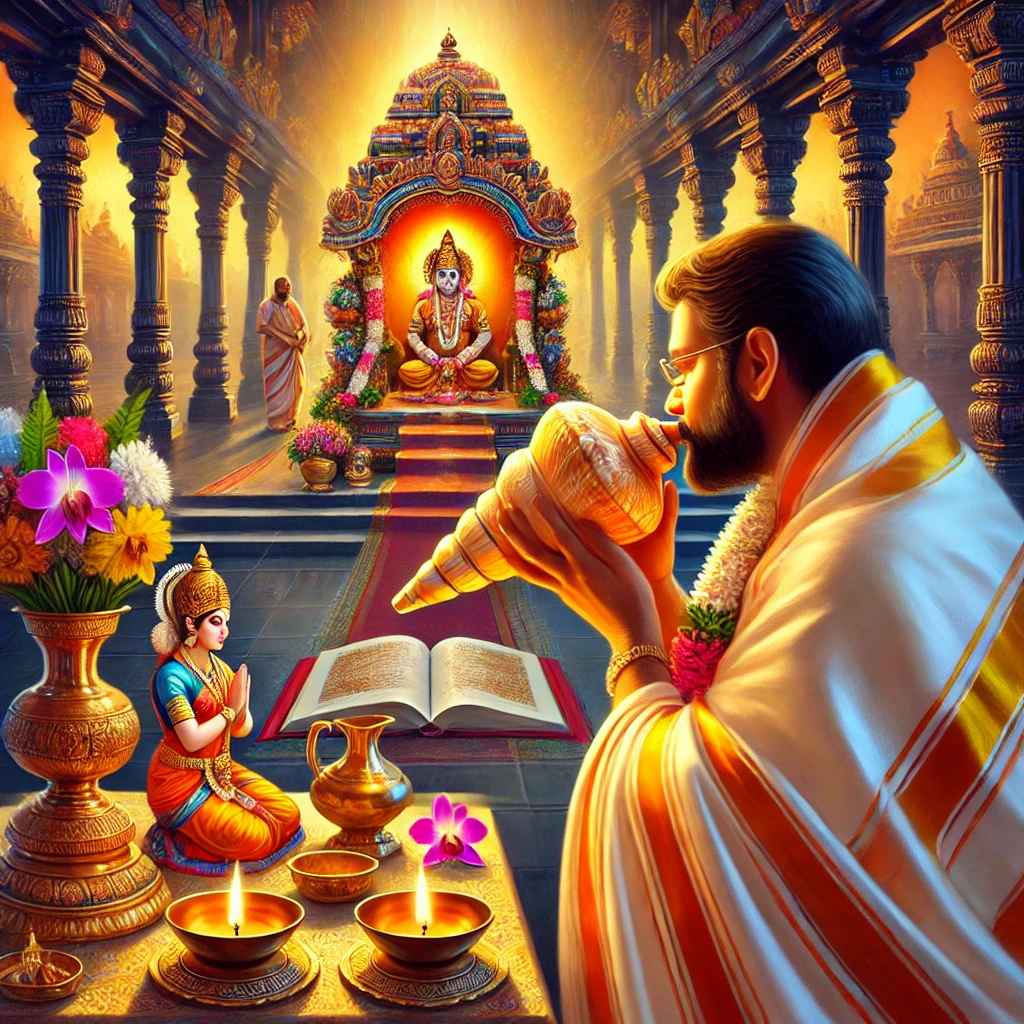
According to legend the demon Shankhasura defeated the devas, stole the Vedas and went to live at the bottom of the ocean. The devas then appealed to Lord Vishnu for help to get back the Vedas, which Shankhasura has stolen.

In Hinduism, the reason behind worshipping idols has more insight than we think it does. It is not the image the idol depicts, but the powers vested in the idols after it has been appropriately invoked and invited to reside in the idol.

In Hinduism, people fast in various ways and for various reasons. It sometimes has materialistic reasons though sometimes it's just spiritual. Most of the time, fasting is done on festivals and Ekadashis.

While is western cultures piercing is considered a rebellious act, in Hinduism it is a symbolic tradition. In Hinduism, it is tradition for a bride to wear a particular set of ornaments and the 'Nath' or 'Nose ring' is a very important part of the jewelry she takes to her in-laws' house.

Makar Sankranti, Lohri or Pongal is a very auspicious Hindu festival and is dedicated to Lord Surya. It is also known as the harvest festival and is celebrated in different forms and styles all over India.

"Om" or "Aum" is one of the most auspicious and the most chanted mantra or sound in Hinduism. It leaves an impression of peace and purity on the mind and body of the person who chants it.

You must have heard it everywhere, pujas, school prayers, temples etc. It is a part of life for a Hinduism follower and has an important part to play in Hinduism. It is advised to chant Gayatri Mantra at least three times a day- at dawn, mid-day and after sunset. It is said that it brings positivity and prosperity to one�s life.

For a non-Hindu Aarti or waving lamps might look like an unusual and alien practice, but for a Hindu it is a way to connect to the almighty and pray. More than just a practice its a whole process to invoke the divine and express your gratitude.

Sita is the wife of Lord Rama, the seventh avatar of Vishnu, in Hindu mythology. Sita also considered an avatar of Lakshmi, the goddess of wealth and the partner of Sri Vishnu during the tretayuga.

As Hindus, we are often posed with a question, Why do we worship an elephant-headed, pot-bellied, broken-tusked god who travels on a mouse?

Often we come across the question of Hinduism and Idol worship and the significance of the same. We agree there is more to Hinduism than the Idol, but the significance of the same isn't any less. Idol is a support for the beginner.

Hindus pray or conduct worship everyday - at home and/or also in temples. Mostly though, the temple is the most preferred place of worship, of performing important religious rites at different times of the day, usually dawn and dusk.

The unimaginable advancements in the technology nowadays haven't left any leaves of our lives unturned. The changes may be very minute, but are always essential. 'Cause that's how everything works, right? The rate at which every aspect of the industry is expanding and developing, it makes us realize how important that "change" is.

Lord Shiva is considered to be one amongst the Hindu God trinity, the other two being Lord Brahma and Lord Vishnu. Devotees pray to him in order to get rid of the hardships and obstacles they're coming across in life.

Nearly all of us know a person who seems to be very unlucky when it comes to matters of learning. He might try as hard as he can, everything earnestly and repeatedly, he finds he does not score well on exams.

The different kinds of India puja that are performed by Hindus can make for a fascinating study. There are daily, earnest pujas done at home by bhaktas, and more elaborate ones done at temples, often several times a day.

Throughout the ages, there have always been people who have tried to prove that wealth and being wealthy is an evil. A simple analysis, however, will show the rational person that this is not the case at all. Wealth is not inherently bad, but it is human beings who give it its character.

A historic temple puja, or a puja done at a temple that is known for having worked wonders for bhaktas in the past, can be a good way to better one's life.There are many temples in India that have withstood the passage of time and are as well-known among pious people today as they were more than 15 centuries ago.

Marriage is an important part of nearly all societies. This is why those who are desirous of marrying but have not yet found a partner, find themselves disheartened. Similarly, there are many married couples who do not get along as well with one another as they would like to, no matter how compromising they try to be in their relationship.

Though medical science has advanced and pregnancy and childbirth have become more convenient for women, it is true that often complications arise which modern medical science cannot predict or prevent. A lot of women fail to conceive, or can only do so after expensive, time-taking fertility treatment.

The internet has reached even the most remote corners of the world today, and made our lives tremendously better in many ways. There are innumerable good uses to which people put the internet, and one of these is to perform pujas through online booking.

Matters related to planetary influences on one's life can be very complicated, and only learned pundits can correctly state why a person is facing problems that seem insurmountable, no matter what one does to overcome them.





 © 2026 ePuja
© 2026 ePuja